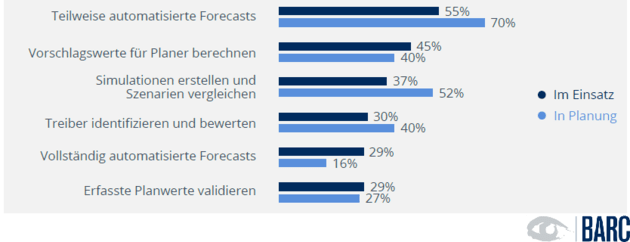Press release – BARC Study: Predictive Planning and Forecasting Leads to Competitive Advantages
The analyst firm BARC today published the study “Predictive Planning and Forecasting on the Rise – Hype or Reality?”, for which 295 companies of various sizes and industries worldwide were surveyed. The study shows that 27 percent of respondents already use predictive algorithms and machine learning (ML) in corporate planning (“predictive planning and forecasting”). Another 17 percent are currently developing corresponding solutions or using prototypes. In a BARC study from 2020, only 4 percent said they supported corporate planning with predictive planning.
Study author Dr. Christian Fuchs, Senior Analyst at BARC, commented on the results: “The survey shows that many companies have recognized the potential of predictive planning and forecasting. Corporate planning benefits from more accurate, more frequent and automated forecasts, and relieves planning teams of routine tasks.”
Partial automation of forecasts is the primary use case, adopted by 55 percent of the companies surveyed (see figure below).

© BARC 2022
The study results also show that concerted actions deliver more benefits to companies than isolated measures. Study author Robert Tischler, Senior Analyst at BARC, emphasized: “The data from our study clearly shows that predictive planning delivers more benefits when it is embedded in a comprehensive realignment of the company or finance department. This often allows synergies to be exploited and the use of resources to be optimized.”
Predictive planning and forecasting is most often implemented with data science tools (60 percent overall, and 72 percent for larger companies). These are particularly suitable for implementing a wide range of use cases, which can be individually designed or sophisticated, but also require competent resources. 53 percent of respondents use analytics & BI tools, while only 36 percent use enterprise planning software with integrated predictive planning capabilities.
About The Survey
Predictive Planning and Forecasting on the Rise – Hype or Reality? is a BARC study that examines current usage of predictive planning and forecasting and compares it with the results of past BARC studies. The study is based on a worldwide survey of 295 companies of different sizes and industries.
The authors of the study are Dr. Christian Fuchs and Robert Tischler, Senior Analysts for Data & Analytics at BARC.
The study is available for download free of charge thanks to sponsorship by Board, Corporate Planning, Jedox, OneStream, PwC and Serviceware.
